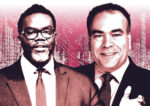Soaring property taxes have Chicago’s economically vulnerable homeowners facing a difficult choice: take on unsustainable debt or risk losing their homes.
Last summer, homeowners in Chicago’s southern suburbs received an unwelcome surprise when their property tax bills arrived with a median increase of almost 20 percent, the largest hike in three decades, Crain’s reported.
For many residents in majority-Black municipalities like Harvey, Markham and Dixmoor, where median household incomes range from $24,500 to $69,700, the tax hikes were even more severe, with increases exceeding 30 percent.
Skyrocketing property taxes are the latest blow to these struggling towns. The situation is especially dire for Black homeowners, who are most hurt by the substantial increases, due to residing in homes with stagnant or declining values.
“The south suburbs are the poster child for inequitable property taxation in Illinois, and now it’s worse than ever for homeowners,” Cook County Treasurer Maria Pappas said.
The consequences of these tax hikes are all too visible. Harvey, once a thriving industrial hub, now bears the scars of decades of economic decline. The city’s landscape is dotted with abandoned homes and boarded-up businesses, the result of a long history of job loss and population decline.
Harvey’s story is a familiar one to many industrial towns in the Midwest. In the 1950s and ’60s, the city boomed, attracting residents with its thriving manufacturing sector and robust infrastructure. However, by the 1970s, rising inflation, foreign competition and soaring gas prices led to a steep decline, forcing major employers out of business and the town’s population to plummet.
The tax hikes have only deepened the city’s financial woes. As property values fall and residents struggle to pay their taxes, local governments are left with fewer resources to provide essential services. Municipal debt rises, services are cut, and residents who can afford to leave do so, further reducing the tax base.
It’s a vicious cycle that leaves residents bearing the brunt of the burden. In Dixmoor, where the median household income is $57,823, the typical tax bill surged from $877 to $1,950 this year, marking a 122 percent increase.
Private investors have taken advantage of the situation, using loopholes in Illinois’ tax system to extract millions from already struggling municipalities. These so-called “tax buyers” purchase the taxes owed on delinquent properties, only to later back out of the deal and receive refunds, which come from the tax receipts intended for local services like schools and parks.
This practice has drained nearly $280 million from communities that can least afford it, according to a 2022 study by the Cook County Treasurer’s Office.
Despite these challenges, there are efforts underway to revitalize the region. In 2022, the South Suburban Mayors & Managers Association hailed the Southland Reactivation Act as a tool to attract developers by offering tax incentives for purchasing commercial properties in struggling townships like Thornton, Bloom and Calumet.
Federal support has also come in the form of a $20 million U.S. Department of Transportation grant, earmarked for the revitalization of Harvey’s public transportation hub. The plan includes renovating the downtown Metra station and expanding the nearby Pace terminal, aimed at making it easier for residents to access transportation and attracting new businesses to the area.
Smaller projects like the $19 million Harvey Lofts development aim to breathe life into the city’s downtown, offering 51 residential units with the hope of luring renters and businesses back to the area.
Still, as the struggle continues, residents like Bonnie Rateree remain committed to the community.
“Harvey is like a pretty girl gone bad. Everybody wants a piece of her, but nobody wants to take care of her,” said Rateree, who has lived in Harvey for decades. “I will never give up,” she added.
— Andrew Terrell
Read more



